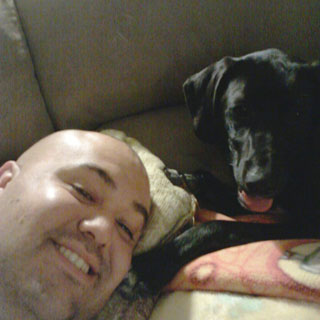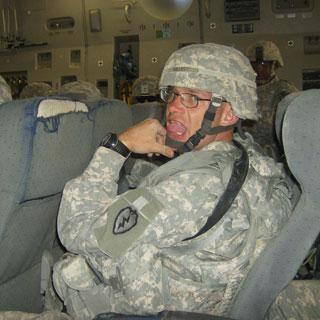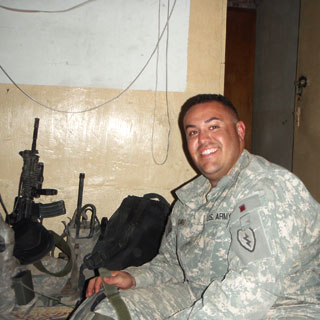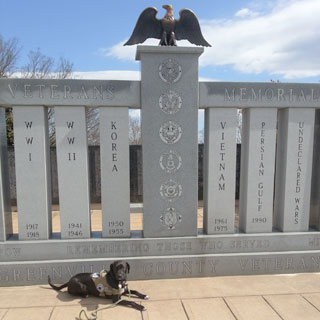David enlisted in the U.S. Army in 2005 and served until 2009. His father-in-law, who served in Vietnam, influenced his decision to join the military. David was first stationed at Fort Benning, Georgia and completed Infantry basic. He was then with the 25th Infantry Division in Hawaii and began training in Army Combatives. His brigade transitioned from a light infantry unit to a mobilized Stryker brigade. His unit deployed to Iraq at the end of 2007 and his company was stationed in a Forward Operating Base (FOB) in Albu Alwan, near Baghdad.
Soon after that, in February, 2008, Sgt. Gary Willett, a close friend of David’s and who he served under, was killed in an Improvised Explosive Device (IED) explosion. Every day for a month, David had to pass by the Stryker vehicle in which Sgt. Willett lost his life. David’s company captured four combatants believed to be responsible for the IED explosion.
In April 2008, David’s company was sent to contain an operating base near Sadr City, Iraq. David and his platoon were there for a month engaged in daily contact with combatants. A mortar round landed on the other side of a wall where David was sleeping which resulted in severe hearing loss.
David and his platoon earned the Combat Infantry Badge that, as he says was for “being shot at, shooting someone, and being involved in combat experience.” He was honorably discharged in April 2009.The physical toll on David from these experiences culminated in severe hearing loss, foot and back pain, and PTSD.
After arriving home to his wife and family, David was angry, self-medicating with alcohol, lost, and depressed. In 2010, he sought assistance through the Veteran’s Administration and nine months later he began seeing professionals. He was evaluated and received benefits for his hearing loss and PTSD. He began seeing a therapist who administered medications for his PTSD. The best thing that happened for David at the VA was learning about a nearby Vet Center where he connected with a therapist who was an ex-Marine, “an awesome dude.”
In 2011, at a local animal shelter, David and his family found and saved a dog that had been abandoned by the side of the road. David named him Willett, in honor of his close friend lost in Iraq.
EXCERPTS FROM OUR CONVERSATION:
Vicki Topaz: How did you learn about service dogs?
David Jurado: My father-in-law and I were watching TV and we saw a program that was about a Vet who used a service dog to help mitigate his PTSD issues. I remember making some comment about, why in the hell would a guy need a dog to help him with PTSD. I had alcohol and meds that were working for me. That’s how I heard about the concept of dogs.
I started doing a little research because secretly I wanted to know more. I didn’t want anybody else to know that I was doing this. I mean honestly I didn’t even tell my wife because I just thought of it as a sign of weakness. It’s really hard to come forward and ask for help. You’re taught to suck it up and deal with it. So yes, I did some research in secret and started getting the whole concept about what the dog can do.
Tell me about when you first saw Willett?
My wife and I went looking at a local animal shelter and found Willett. I picked Willett up and oh my god he was so adorable. He came right up and curled up there at my feet and I petted him and then my wife called him over and he laid down at her feet and she petted him and he licked her every once in a while. He was really calm.
How old was he when you found him?
About 4 months. He caught on quick. At about 7 months, he had sit on command, lay down on command, jump up (on this little fence area we had outside). I started taking him to the grocery store, getting him out every once in awhile, places I knew we could go. And then I started training him to do the cover me command.
How did Companions for Heroes (C4H) work with you and Willett?
C4H reimbursed the adoption fee and then they provided a year of pet insurance and paid the first $100 deductible for the first visit.
Mike Sergeant [Vietnam Veteran], the training director told me he’d do anything to help me. I was doing a lot of the training myself because I was so motivated. I called Mike though and asked him for advice on various things. For example, it seemed like every time we would go for a walk, Willett always wanted to pick things up with his mouth. I would bend down and tell him, drop it, leave it.
So I called Mike and told him what was going on. He said, the next time he goes for a walk give him his favorite toy. Labs and retrievers, that’s what they are made for, to hold stuff in their mouth, so give him his favorite toy and see how that works out. So I did and he carried it for a couple of walks and then after that he just stopped picking stuff up off the ground.
What are some of the things Willett helps you with?
Patience. Having to have patience with him when he was a puppy and knowing that he might not pick it up that fast. Even though he was a hell of a dog and was picking it up very fast, I knew I was going to have to have patience with him. And that patience ended up turning into having patience with my 3 year old and my 10 year old and it turned into having patience with my wife. It brought our bond a lot closer.
Willett has also helped get me out of my anti-social shell because I knew that I had to continuously keep taking him out places to get him to understand that this is what he’s going to be doing. At first I started going to Pet Smart and then to the grocery store and certain other places. But I came to realize that I was so much more focused worrying about him than I was about jumping over my own obstacles. I broke out of that anti-shell so quick it was like a blur.
David Jurado and his service dog Willett
You mentioned you’ve had some trouble sleeping.
Yeah, with Willett it’s to the point now where I can lay my head on the pillow and get a good night. As long as I know he’s there, I don’t even take medication for sleep anymore.
With PTSD, I was afraid that when I went to sleep that something was gonna happen and that I was gonna miss it, maybe an intruder was going to break in, and I could not protect my family. I might hear a noise, is that real, or is it not real. Willett is about 52 pounds and for a little guy he’s got one hell of a bark. There’s no way I could miss that. And he would let me know if there was something going on. He sleeps on my side of the bed on his bed mat.
When we go to hotels, like traveling for Companions for Heroes and the Wounded Warrior Project, he stays with me. He doesn’t wander. He wakes me up at about 8 in the morning every day, he’ll jump up and put his paws on me and that will be the only time he does it and then I’ll get up, jump in the shower, change and he’ll lay there on his bed. I’ll come out, put on his harness and we’ll go to the dog park or outside and we’ll walk and he’ll do his business.
Tell me about his harness.
My mom actually bought me a harness, like the ones that the dogs in Iraq wear, like the Explosive Ordnance Detection (EOD) dogs. It’s awesome. I love that damn harness. It is a sand tan color. On one side he has a patch that says “disabled veteran service dog,” and then right next to that is an American flag patch that I actually wore in Iraq—it’s a tan and black color but if you were looking at it with night vision it would illuminate. We call it a IR patch. Then in the center toward the end, we have the Wounded Warrior Project patch that was given to me. On the other side is the disabled veteran patch that says “hearing service dog, do not distract” and right next to it is the Companion for Heroes patch.
I sewed them all on myself. I want to be a part of everything that Willett and I are doing. I did it by hand and it meant a little bit more to me.
Sgt. Gary Willett, flight to Iraq
I also make Willett co-leashes. My father-in-law had a bunch of rope he had actually used for repels in Vietnam, and I said, dude, don’t throw it all away. Let me have some of it. And he said what are you gonna to do with it? I told him, I’ll make a rope leash for Willett. It’s pretty cool. Yeah so now Willett has a small rope leash.
Tell me about the work you are doing for C4H and helping Veterans with PTSD.
I was volunteering in South Carolina but I was talking to heroes from everywhere. I would call them up and ask them some interview questions, find out what they thought a dog could do for them and shared a little bit about what my dog is doing for me. Seeing if they are on board with it and then from there assist them in the adoption process. When they have questions, they can call Mike or me. Of course, the shelters are always about mixes. But we suggest what type of breeds to look into nonetheless and call the shelters to ask them the background of the dog, where the dog came from. Then with the training, it’s all about the empowerment from C4H. And it is awesome.
When I went to the meeting with all of the directors and the paid staff at C4H, Willett and I went down to DC, and everyone thought he was so great. I was so proud of Willett and how he did. He was freakin’ awesome. I couldn’t have asked anything more from him.
With C4H, it’s all about the empowerment….I did it! And I didn’t have to be on a waiting list. I got a companion animal when Willett was a puppy and he kept me definitely motivated and you know I’ve got that military thing in me…gotta get it done and have a goal every day. I put that to work and brought up my own dog and didn’t have to wait 3 or 4 years for a service dog. I only had a year with Willett until he was ready.
In DC I met Mike Sergeant and we were sitting down outside, smoking a cigarette and Mike saw Willett alert to me that a siren was coming. There was a police siren. And Willett had poked me and Mike was rewarding him on a good job. It was really cool.
Now that you have a paid position with C4H, what work are you doing?
My title is Hero Liaison. I have more responsibility, watching over the adoption counselors, assisting Mike with some new pilot programs that we are going to start, and I’m also helping the Executive Director.
It sounds like you are on a great path David.
You know, for me, I just see it as some recognition. I’m not saying dogs are for every Veteran. But it is a resource and it’s a resource that worked for me. I’m trying to show people that you might want to get used to seeing a service dog because when these wars are over we’re gonna see worse things happen. You think the suicide rate is bad now, it’s bound to get worse I think.
I know guys that are amputees and they can run me to the ground and I’m a big boy. I can’t run fast but I’m strong. And all of a sudden I’m seeing these guys that are doing stuff I wouldn’t even consider and I’ve got all my limbs. These guys are sailing right through it. All they want to do is just be a part of what they worked for. That’s the way I see it.
Knowing what you do about having been in combat, being diagnosed with PTSD and having a service dog, what advice would you give to other Veterans who are suffering with PTSD and haven’t sought help yet? What would you say to them?
On a personal level, I’ve had one friend who I served with and he took his life. Now of course I’ve heard other stories too. If I could give the advice, I would say: Talk to somebody. It doesn’t have to be a 1-800# where you talk to somebody you don’t feel comfortable with. Find a support group that is there to help you and lean on them. That’s what they’re there for. My wife, for me, she’s my rock. If I couldn’t lean on her, and Willett, I think I would be a lot worse off.
My advice is talk to somebody and I always tell my buddies, I don’t care what time it is, in the middle of the night, you wake me up, I’ll sit up and listen to you. I might not have the advice or I might not be the right person to ask but I’ll help you out in trying to get that answer when I can.
David Jurado, setting a patrol base (Iraq)
That’s why I volunteer with the Wounded Warrior Project. I also volunteer with Hidden Wounds. Hidden Wounds is basically a hotline that Veterans can call and you get connected to a Veteran right then and there, and it’s just me and another person shootin’ the shit.
And I can tell them, hey dude, I think you need to go talk to a counselor, have you looked into it. Well, no I haven’t. That’s a part of what Hidden Wounds does for you, we can find you a counselor in your area that works specifically with PTSD. We’ll pay for it so don’t worry about it coming out of your pocket. And we can get you some help before you start to process through the VA.
Although in the military you learn not to ask for help, it is ok to ask for help, right?
Yeah, one of the things I learned working with the Wounded Warrior Project is, we’re all destined to fail. If you do not fail, then you do not live basically. You are going to fail. It’s going to happen. It is a matter of you saying, hey I’m going to do this this week and then you forget, then that’s a fail. I’m gonna run 2 miles but you can only get in a mile, then that’s a fail. There are a lot of people with that frame of mind, like, I can’t fail. Failure is not an option. I was like that. But then I learned that if you do fail, it’s ok, there’s always gonna be tomorrow. The sun is going to rise again. Work on it and when you do succeed, celebrate the shit out of it. Take the family out to dinner. Hey everybody, I got Willett to sit today! Yay!
Have you been challenged in public, taking Willett everywhere you go?
When I went to DC we were staying at the Marriott and when we got to the hotel they looked at Willett and asked me, Is that a service dog? And I told them, here’s your sign—pointing to his vest. But they said they needed to see the paperwork and I said, Well, what paperwork do you need to see? Well, the paperwork saying he is a service dog. And I turned around and told them, per the ADA Federal law, it’s against the law for you to ask me for that and that shut them up real quick. They said, Oh yeah, we just wanted to make sure he wasn’t a pet.
Willett at VA office, Greenville, SC
And you know, he is not a pet. Granted at home, he’s a pet. He’s my battle buddy. But out there though, he knows when his vest is on that he’s working. Everyone at my apartment complex, when they see us at the dog park, they have a hard time believing that Willett is a service dog. He just goes ape, he’s chasing the squirrels, he’s barking at birds, he’s running around chasing the other dogs. He’s playing with the ball…that’s his playtime. And he has to be a dog. And I enjoy having that time with him. But then sometimes our apartment complex has events, like we had a chili cook off. I got nominated to come in and be one of the guest judges. And I came in with Willett and I told him to lay down, he laid down, and I told him to stay and he was off the leash. But he stayed close enough to me so that I could see him and he could see me. He curled up in a little ball and laid there and he just kept starin’ at me the whole time. Everybody was just amazed. They were like oh my god, it’s a totally different dog. And I said, Yeah I told you, when he gets that harness on he knows it’s time to work, he knows exactly how he should behave. I don’t have any issues from him.
My mom is not an animal person. But my mom can see what Willett is doing for me and how I’ve changed. I can tell her, Hey mom I like this patch and I want to put it on Willett’s vest, or I like this harness like the one she got me, and she’ll get it for me. Anything I ask for, for Willett, she would buy for me in a heartbeat, just because she knows it’s working.
#
RESOURCES | INFORMATION:
- David Jurado is a Call Center Operator at Medals of America.
- David also volunteers for Hidden Wounds, “Helping Heroes Battle the Invisible War at Home.”
- Photographs courtesy of David Jurado.




